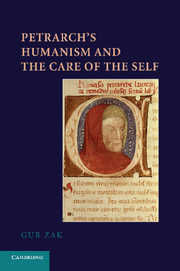Book contents
- Frontmatter
- Contents
- Acknowledgments
- Introduction
- 1 The Indeterminate Self: Writing, Desire, and Temporality in Petrarch's Rerum vulgarium fragmenta
- 2 The Crisis of the Narrative Self
- 3 Petrarch's Humanism and the Ethics of Care of the Self
- 4 Ovid, Augustine, and the Limits of the Ethics of Care of the Self
- Conclusion
- Bibliography
- Index
4 - Ovid, Augustine, and the Limits of the Ethics of Care of the Self
Published online by Cambridge University Press: 24 April 2010
- Frontmatter
- Contents
- Acknowledgments
- Introduction
- 1 The Indeterminate Self: Writing, Desire, and Temporality in Petrarch's Rerum vulgarium fragmenta
- 2 The Crisis of the Narrative Self
- 3 Petrarch's Humanism and the Ethics of Care of the Self
- 4 Ovid, Augustine, and the Limits of the Ethics of Care of the Self
- Conclusion
- Bibliography
- Index
Summary
Petrarch's attempt in his collections of letters and the Secretum, described in the previous chapter, to use writing to care for his own self, to provide him with authority and control over desire and the emotions, is in direct opposition to the nature of writing in his vernacular poetry. As shown in Chapter 1, in the Rerum vulgarium fragmenta, writing is always dominated by desire and longing and serves to rekindle and intensify the poet's desire and emotions. By that, writing allows him to return to the golden age of his youth and to keep his hope for poetic immortality alive, providing him with a sense of being and presence. From the Stoic perspective, however, as the poems imply, such writings – because they serve as instigators and associates of earthly desire – only lead the self further away from virtue into the exile of fluctuation and change. Petrarch's ethical goal in the Latin writings is therefore largely to detach himself from the matrix of desire and writing that dominates his writings in the vernacular.
In the first Eclogue of the Bucolicum Carmen, Petrarch alludes directly to this division between his Latin writings, which were influenced by Virgil, and his writings in the vernacular. He attributes the many problems and cares that plague his life to his youthful decision to leave behind the benevolent impact of Virgil (Dulcissimus Parthenias) and adopt instead a new, misguided style: “But an age followed after / Bolder; I dared with no guide make my own way into the forest, / Dense as it was, unafraid of the savage beasts that roamed in it.
- Type
- Chapter
- Information
- Petrarch's Humanism and the Care of the Self , pp. 121 - 157Publisher: Cambridge University PressPrint publication year: 2010



